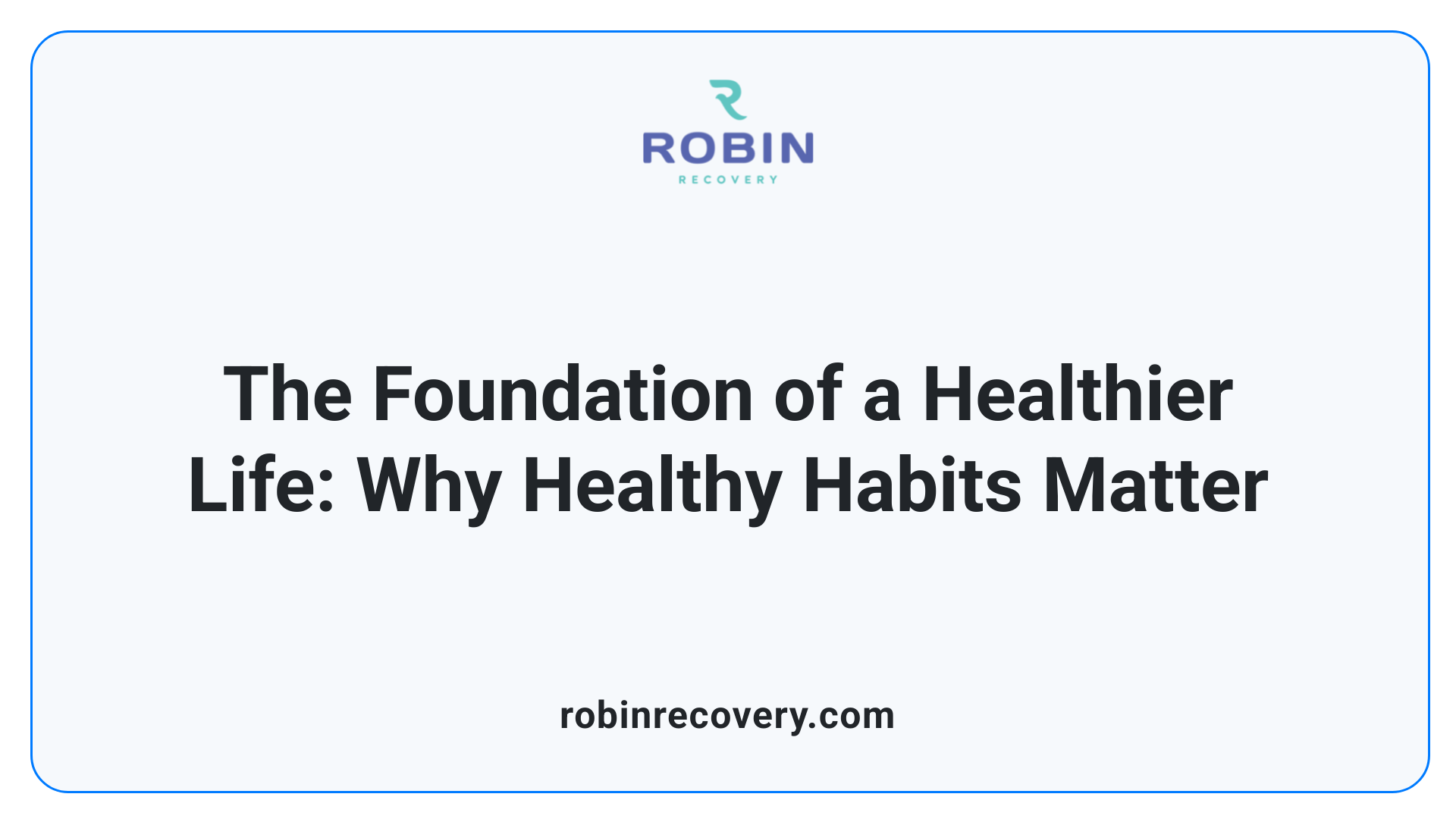How to develop healthy habits during and after treatment

Navigating the Path to Wellness
Developing healthy habits is crucial for individuals at various stages of treatment and recovery. Building a foundation of good practices not only aids immediate recovery but also ensures a long-term commitment to health and well-being. This narrative explores how healthy habits can be formed and maintained before, during, and after treatment, providing actionable insights and strategies for a successful journey to better health.
Understanding the Importance of Healthy Habits

What is the importance of healthy habits?
Healthy habits are essential as they significantly contribute to both physical and mental well-being, which can lead to increased longevity and a higher quality of life.
These habits, such as maintaining a balanced diet, exercising regularly, and ensuring adequate sleep, reduce the risk of chronic diseases like heart disease and diabetes.
Forming good habits often requires a structured approach, including setting achievable goals, tracking progress, and involving support from friends and family.
How do healthy habits impact mental and physical well-being?
Engaging in positive mental habits can enhance resilience and reduce stress, promoting a healthier lifestyle overall. Healthy eating and regular exercise are particularly impactful for those in recovery, helping manage weight, boost energy, and improve mood.
Practices such as mindfulness meditation and yoga support mental clarity and emotional stability, which are crucial during and after treatment.
What are the long-term benefits of establishing healthy routines?
Establishing healthy routines early in life is particularly important, as these behaviors tend to carry into adulthood, fostering long-term health benefits.
These benefits include better management of chronic conditions, improved mental health outcomes, and a supportive network fostered by engaging friends and family in healthy activities.Additionally, practices like tracking progress or developing a structured schedule can maintain accountability, aiding in the transition to a healthier lifestyle.
Steps to Develop Healthy Habits During Treatment

Stages of Changing Habits
Changing habits during treatment involves a journey through several crucial stages:
- Contemplation: This stage is all about recognizing the need for change and becoming motivated to adopt healthier behaviors.
- Preparation: Here, individuals set specific goals and devise a strategic plan to implement changes, laying a foundation for long-lasting habits.
- Action: This is where the rubber meets the road; individuals actively change their dietary and physical activity habits to support recovery.
- Maintenance: This stage focuses on making new habits a regular part of life, ensuring sustained improvements in health post-treatment.
Specific Strategies to Adopt New Habits
To effectively develop healthy habits, consider the following strategies:
- Start Small: Begin with manageable actions, such as aiming for a 10-minute walk daily.
- Set SMART Goals: Make your health objectives Specific, Measurable, Attainable, Relevant, and Time-bound for clarity and focus.
- Adopt Habit Stacking: Link new habits to existing ones, like taking vitamins right after brushing your teeth, to ease transitions.
- Track Progress: Use apps or journals to log your journey, which can enhance motivation as you see your achievements accumulate.
Role of Support Systems in Habit Formation
Surrounding yourself with a supportive network is vital for fostering healthy habits:
- Involve family and friends in your journey—they can encourage positive behaviors and reinforce your commitment to change.
- Engage in community support groups; sharing experiences and challenges can facilitate accountability and provide motivation.
- Encouraging mutually beneficial activities, such as exercising together, can strengthen your support system while enhancing your health.
Examples of Daily Healthy Habits

What are examples of healthy habits to follow every day?
To foster a healthier lifestyle, consistent daily habits are essential. Here are some beneficial practices:
- Balanced Diet: Aim to consume a variety of fruits, vegetables, whole grains, and lean proteins. This not only boosts physical health but also aids in recovery.
- Stay Hydrated: Drinking plenty of water is vital. Adequate hydration helps maintain energy levels and supports overall bodily functions.
- Regular Exercise: Incorporating physical activities, such as walking, strength training, or yoga, significantly improves physical and mental well-being. Set aside time for at least 150 minutes of moderate exercise each week.
- Sleep Hygiene: Prioritize a regular sleep schedule, getting between 7 to 9 hours nightly. This promotes recovery and enhances mental clarity.
- Mindfulness Practices: Engage in activities like journaling to reflect on gratitude or practice deep breathing to reduce stress.
- Social Connections: Nurturing friendships and participating in enjoyable hobbies can enhance mood and diminish stress levels.
Impact on physical and mental health
Adopting these habits positively influences both physical and mental health. Regular exercise releases endorphins, improving mood, while a nutritious diet supports bodily energy and resilience during recovery. Mindfulness fosters emotional stability, serving as a strong buffer against stress.
Simple habits to incorporate daily
Start small to build sustainable habits:
- Drink Water: Keep a water bottle handy to encourage hydration.
- Move Around: Take short breaks to walk or stretch throughout the day.
- Establish a Sleep Routine: Prepare for bed at the same time each night.
- Reflect on Positivity: Spend a few moments each day to write down what you're grateful for.
By steadily integrating these habits into daily life, individuals can transform their health and recover more effectively.
Maintaining Healthy Habits in Recovery

Sustaining New Habits
Maintaining healthy habits after treatment is essential for long-term recovery and overall well-being. The journey involves multiple stages: contemplation, preparation, action, and maintenance. By recognizing these stages, you can navigate the process effectively.
Healthy eating and regular physical activity are vital components. Incorporating a balanced diet rich in fruits and vegetables helps not just in managing weight but also in boosting energy levels. Physical activity, recommended at least 150 minutes weekly, supports mood enhancement through endorphin release.
Challenges in Maintaining Habits
While developing healthy habits is useful, challenges often arise. Emotional triggers, stress, and the fast-paced nature of life can disrupt routines. Understanding mental health’s role is crucial. Stress management strategies, like mindfulness practices, can mitigate risks of relapse.
Strategies to Overcome Barriers
To overcome barriers, consider creating structured plans that mimick therapeutic schedules. Habit stacking—linking a new habit to an existing one—can ease the adoption of healthier behaviors. Additionally, enlisting support from friends or family can reinforce your commitment to these changes.
Some practical strategies include:
- Set Specific Goals: Define actionable and measurable objectives, like eating two servings of vegetables at each meal.
- Track Progress: Use journals or apps to monitor your journey and stay motivated.
- Plan for Obstacles: Anticipate challenges and develop proactive plans to maintain your habits.
- Rewards System: Celebrate milestones to reinforce positive changes.
By fostering an environment that supports your goals and understanding individual health needs, you can navigate the complexities of sustaining healthy habits effectively.
Healthy Eating Habits for Recovery

Nutritional Needs During Recovery
During recovery, focusing on nutritious eating habits is essential to support healing and overall health. A balanced diet, filled with vitamins and minerals, aids in managing treatment side effects such as fatigue and nausea. Concentrating on whole foods can enhance physical strength and boost energy levels, vital during this transformative period.
Examples of Nutritious Diets
Here are a few types of diets to consider:
- Mediterranean Diet: Emphasizes whole grains, fish, legumes, fruits, vegetables, and healthy fats (like olive oil).
- Balanced Plate: A simple way to visualize meals by filling half the plate with fruits and vegetables, a quarter with protein, and a quarter with whole grains.
- Plant-Based Diet: Focuses on whole plant foods—grains, beans, nuts, seeds, fruits, and vegetables—providing ample nutrients and fiber.
Steps to Establish Healthy Eating Patterns
To develop healthy eating habits, consider the following practical steps:
- Plan Meals: Create a meal schedule that includes nutrient-dense foods.
- Set Goal Actions: Aim for at least 5 portions of fruits and vegetables daily, such as a banana with breakfast and a salad for lunch.
- Experiment with Cooking: Try new recipes that utilize whole grains and fresh produce to keep meals exciting.
- Stay Hydrated: Drink at least 6 to 8 glasses of water daily to support bodily functions.
- Monitor Progress: Use apps or journals to track your food intake and identify areas for improvement.
By establishing a healthy eating routine, you can significantly enhance your recovery journey.
Creating a Supportive Environment for Healthy Habits
Role of environment in habit formation
Creating a supportive environment is crucial for establishing healthy habits. This begins with evaluating your surroundings to ensure they promote your goals rather than hinder them. Simple steps like stocking the kitchen with nutritious foods or organizing your workout gear in a visible space can make healthy choices easier and more accessible.
Supportive social networks
The people in your life play a significant role in maintaining healthy habits. Engaging with family and friends who support your goals can encourage accountability and motivation. Joining fitness groups or community classes can amplify this effect, as people often mimic the behaviors of those around them.
Identifying and reducing negative influences
To foster positive change, it's important to identify negative influences in your environment. This could include distancing yourself from people or situations that tempt unhealthy behaviors. For instance, if certain social circles trigger past habits, consider adjusting your interactions.
How can we develop good habits?
To develop good habits, start by clearly identifying the specific habit you want to cultivate and commit to making a change. Begin with small, manageable goals to avoid feeling overwhelmed; for instance, if you want to exercise, start with a daily 15-minute walk. Consistency is key, so try to perform the habit at the same time each day to help solidify it into your routine. Additionally, seek support from friends or family, as having a 'routine buddy' can enhance motivation and accountability. Finally, monitor your progress regularly, as this will help you stay on track and make any necessary adjustments to your plan.
The Path Forward
Developing and maintaining healthy habits during and after treatment is a multi-step process that involves planning, support, and commitment. By incorporating small, consistent changes and enlisting help from supportive networks, individuals can significantly enhance their recovery journey. These healthy practices not only lead to better immediate outcomes but also lay the foundational stones for a lifetime of improved health and well-being.
References
- Changing Your Habits for Better Health - NIDDK
- What Steps Can I Take To Incorporate Healthy Habits Into My Life ...
- Creating Healthy Habits | NIH News in Health
- Tips for Maintaining Healthy Habits in Recovery | The Guest House
- Top 10 Healthier Habits to Learn in Outpatient Therapy
- How to build healthy habits that stick - Kaiser Permanente
- 4 Steps for Creating Healthy Habits - Harvard Pilgrim Health Care
- Proven Strategies to Build Healthy Habits - Eileen West, MD
